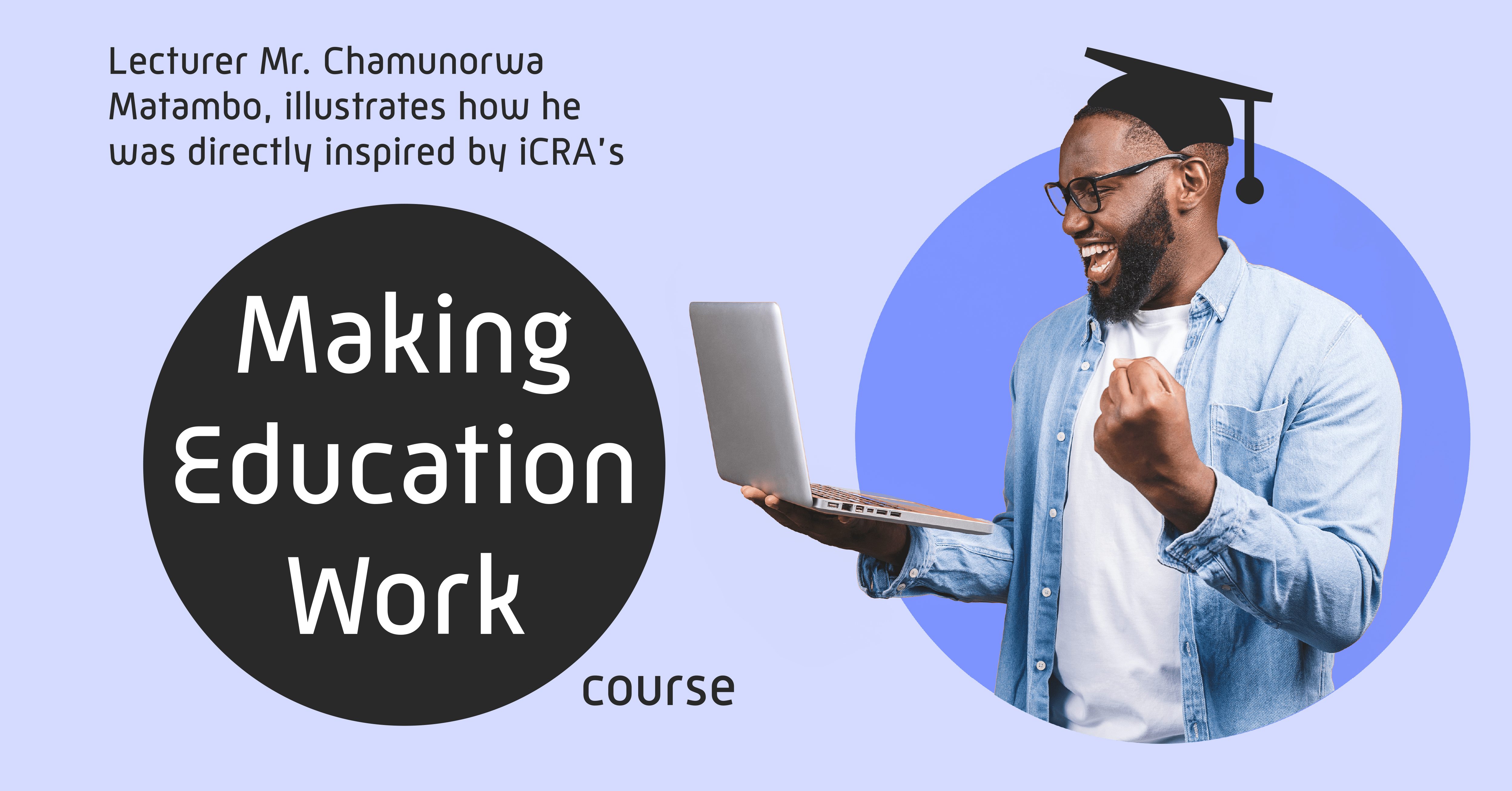
Mr. Chamunorwa Matambo – Inspired by Making Education Work
Big strides in teaching because of the MEW course
South African students expressed enthusiasm during a recent online discussion about new teaching methods introduced in their Crop Production and Agribusiness courses at the Fort Cox Agriculture and Forestry Training Institute (FCAFTI). Three major changes brought in by lecturer Mr. Chamunorwa Matambo were directly inspired by iCRA’s Making Education Work course (last quarter of 2020). These were: “Flipping the Classroom”, use of Intermediate exercises, and the Real Life Learning approach.
While lecturers the world over have had to adapt at record speed to teaching online due to the lockdown restrictions imposed by the Covid19 pandemic, Mr. Matambo (or “Chamu” in short) was able to suddenly take big strides because of changes he initiated while participating in the iCRA course.
Flipping the classroom and Intermediate exercises
A particular advantage was the fact that Chamu started making recorded “flipped classroom” videos about the theoretical part of his lectures. These he sends to students ahead of class to watch on their own time. First year crop production student Milisela Mlanjeni was surprised by the relief this provided: “Sometimes I’m feeling drowsy in class and can’t pay attention, but with the videos, we can look at them when we are fully awake and can even repeat parts if needed to be sure we understand them. Then when we get to class we can go faster.” When students then go to class, instead of a lecture, they get Intermediate exercises that get them to understand the practical implications of the theory. These are in the form of questions Chamu has prepared for them to work on individually or in groups. The size of classes is typically 40-45 students, and can extend up to 80 students. The lockdown ended in March but when having to work online, Chamu organised Breakout Room discussion groups, and he moved from room to room while students were working. After around 20 minutes, they students come back together in plenary, and the leader of each group reports. According to Milisela, the new set-up has helped the students to “understand and remember the topics better.”
Chamu finds that making a flipped classroom video ahead of time allows for higher quality learning because it avoids the interruptions you get in lecturing online in real time. As well, students can learn at their own pace. His students are certainly happy with the quality. Second year crop production student, Mivuyo Dina stated that he prefers flipped classroom videos to attending the lectures at school: “The videos are helpful – shorter but with much information, and heightened by multimedia images. I find that I can focus better when studying on my own – there are fewer distractions and it goes more quickly.” Milisela added: “The quality of the videos is good, and they are easy to download on Whatsapp. Sometimes the wifi is unreliable on campus and so we have to download them ourselves. I don’t mind the extra cost but some people will have problems if they need to pay for it themselves.”
Real life learning
The third method that introduced another way of working for Chamu was the “Real life learning” approach. This involves getting advanced students into a practical experience in the real work setting. The lockdown certainly added extra complications, but Chamu still managed to find a way around the rules. FCAFTI had organised data bundle of 30 gigabytes per month during the 2020 lockdown for each student to participate in online learning and cover their communication costs. Chamu’s students could also use this for the Real life learning assignments he tasked them with: for example, interviewing farmers about irrigation-related challenges that they encountered on their farms. Because of the lockdown, students could not go as a group, but visited the farms individually to interview, make videos and take photographs about the challenge. Back at home they made a literature review around the challenge and then talked to three industry experts to help them come up with solutions for the challenge. To be sure they truly carried out the work, students had to submit evidence of the consultations (as a recording or chat message strings) along with their final report. They also needed to give feedback to the farmers. Chamu found that in general, the farmers and experts were quite receptive to students visiting, calling or writing to them as students of FCAFTI, which is a well-known agricultural institution. In some instances, the students needed a letter from the institution allowing them to do research with the farmers and industry experts. Chamu was also heartened by the spirit of community engagement among industry partners, some of whom gave quite some time to help students gain knowledge.
And how did the students find the real life learning component being added to their studies? Second year crop production student, Khanya Makholwane told about how it allowed her to “actually see what it is the farmers do! It was very helpful as we could experience it first-hand. This is much better than only learning about it from a book – much more practical.”
Resistance to change
Chamu has tried to share new teaching approaches and concepts with his colleagues. While two enquired further about the approaches, they have not followed through in changing their own practices. The tendency is that lecturers simply give the lectures online as they would have given them in class. This is a pity for the students’ ability to learn. Chamu explains that since there are often problems with the internet or electricity, it is simply impossible for all students to fully attend the online lectures. What can happen then is that many students fall behind, which, as Chamu notes: “you can’t blame the students for.” Students can then try to get notes from others who managed to attend, or if they are lucky their lecturer records the online lectures so that students can download them later.
However, Chamu has noticed that many lecturers feel uncomfortable about recording their lectures because then they open themselves up to potential criticism. He understands how delicate this fear can be, but “one thing I learned from the iCRA course is that you don’t wait to have a perfect product – you just get going, and as time goes by and with feedback from the students, you will improve.” Chamu also guesses that lecturers resist changing their methods to include prepared videos and more moments for practice because they would need to be better organised and well ahead of time, which takes effort and motivation.
If it were up to the students, there would be no going back to the old way of learning. Second year Agribusiness student, Anam Mtimkulu stated: “This year was the first time we used an online learning platform. It helps teachers become more efficient educators, because they can deliver the lessons better, and they fulfil different learning styles through a mix of online, discussion as well as learning in the field. I prefer the mix of face-to-face and online. Then you can do it on your own, and when we meet face-to-face, we get the chance to ask questions and discuss.” Milisela agreed: “I’m loving the experience of online learning. I’m from a rural area so this is all new to me.”


Recent Comments